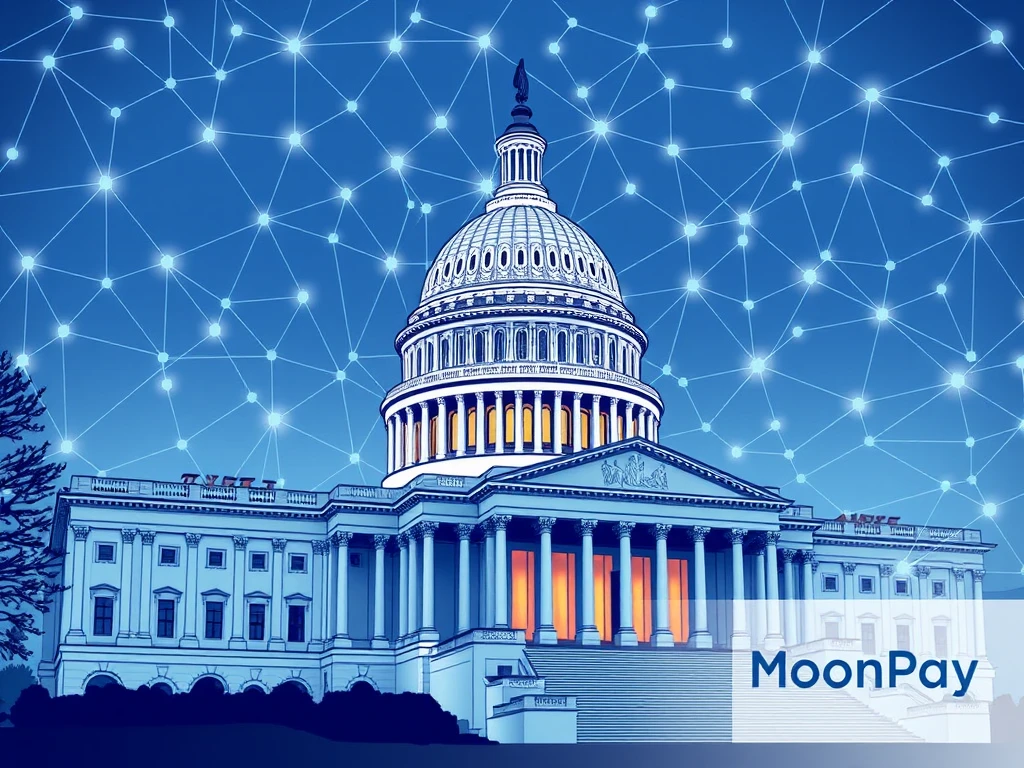Crucial Call: MoonPay CEO Champions State Authority in Stablecoin Regulation Debate

The landscape of cryptocurrency regulation in the United States is at a pivotal juncture, particularly when it comes to stablecoins. As Congress grapples with crafting comprehensive legislation, voices from the crypto industry are becoming increasingly crucial. Ivan Soto-Wright, the CEO of prominent crypto payment firm MoonPay, has stepped into the spotlight, urging lawmakers to ensure that state-level regulators retain their authority in the forthcoming stablecoin framework. Why is this call so significant, and what does it mean for the future of stablecoins?
The Heart of the Matter: State Authority in Stablecoin Regulation
For years, the cryptocurrency sector has navigated a patchwork of state-by-state regulations, often leading to complexity but also fostering innovation through localized approaches. Now, as federal legislation looms with the GENIUS Act in the Senate and the STABLE Act in the House, there’s a critical debate about the balance of power between federal and state regulators. Soto-Wright’s appeal underscores a vital concern: preserving the role of state regulators who have already been active in providing clarity and oversight in the crypto space. He argues that these state bodies are not just relevant but essential for continued consumer protection and industry growth.
Decoding the Congressional Bills: GENIUS Act and STABLE Act
Understanding Soto-Wright’s call requires a closer look at the proposed legislation. Both the Guiding and Establishing National Innovation for US Stablecoins (GENIUS) Act and the Stablecoin Transparency and Accountability for a Better Ledger Economy (STABLE) Act aim to establish a federal framework for payment stablecoins. Key aspects of these bills include:
- Federal Oversight: Both bills propose creating a category of “permitted payment stablecoin issuers” (PSIs), suggesting a move towards federal oversight to standardize stablecoin operations across the US.
- State Pathways: The STABLE Act acknowledges “state qualified” issuers, hinting at a potential dual system. However, concerns arise about the GENIUS Act potentially favoring federal regulators and the Federal Reserve, potentially overshadowing state-level initiatives.
- Regulatory Clarity: The intention behind both bills is to bring much-needed regulatory clarity to the stablecoin market, addressing concerns around consumer protection and market stability.
MoonPay CEO’s Stance: A Champion for State Regulators
Soto-Wright’s stance, articulated in his recent X post and a formal letter to congressional leadership, is clear: Congress must “keep state-regulated issuers in the game.” He emphasizes that state regulators have been proactive in offering regulatory clarity and supervision, fostering consumer protection and enabling growth within the crypto industry. His argument is bolstered by the Conference of State Bank Supervisors (CSBS), which echoed similar sentiments in their April 1 letter, advocating for a state-level approach. Soto-Wright believes that the GENIUS Act currently “stacks the deck” in favor of federal regulators, potentially marginalizing the valuable role state regulators play. He advocates for a system where state regulators meeting federal standards are placed on equal footing with their federal counterparts.
Why State Authority Matters: Benefits and Implications
The push to maintain state authority in stablecoin regulation is not just about jurisdictional preference; it carries significant implications:
- Innovation Hubs: States like New York and Wyoming have been at the forefront of crafting crypto-friendly regulations, attracting innovation and investment. Diminishing state authority could stifle this localized innovation.
- Consumer Protection: State regulators have developed expertise in local markets and consumer needs. A purely federal approach might overlook nuances critical for effective consumer protection at the state level.
- Regulatory Agility: State regulatory bodies can often be more agile and responsive to the rapidly evolving crypto landscape compared to slower federal processes.
- Competition and Choice: Allowing state-regulated PSIs to thrive alongside federally regulated ones can foster competition and provide more choices for businesses and consumers.
The Road Ahead: Balancing Federal and State Interests
As Congress moves closer to a floor vote on these crucial bills, the debate over state versus federal authority in stablecoin regulation remains intense. The crypto industry, while largely in favor of federal clarity, recognizes the value of state-level experience and agility. The challenge lies in crafting legislation that provides a unified national framework without undermining the crucial contributions of state regulators. Soto-Wright’s call to action is a reminder that effective stablecoin regulation should be a collaborative effort, leveraging the strengths of both federal and state systems to foster innovation, protect consumers, and ensure the responsible growth of the cryptocurrency market. The coming months will be critical in determining the final shape of stablecoin regulation and the balance of power between federal and state authorities in this dynamic sector.








